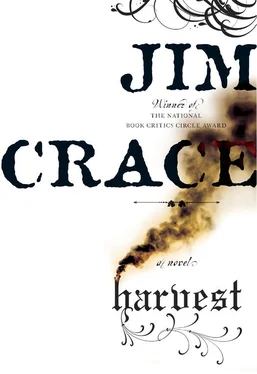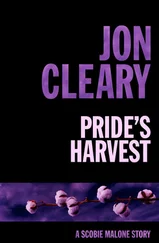He is a smaller man than any of the Jordan constables, and lighter even than the steward, who, though quite short, is built of oak. That’s not to say the groom isn’t dangerous — but he’d be more dangerous to women or to the horses in his charge than to Lizzie’s father, Gervase Carr, a quietly violent man when it most counts. Where is his daughter, he wants to know, asking roughly but from a distance, at first. The groom just shrugs, but doesn’t turn. He knows enough about the weighing of the world to judge that a gentleman’s groom will tip the scales more heavily than a clodhopper. Gervase takes a step forward toward the bench where I am sitting and toward the groom’s back. Another half a dozen steps and he will be able to reach out and seize this fellow by his scruff. “It’s Lizzie Carr I’m talking of. You’ve seen her, haven’t you? She’s just a little twig of a girl. Your master has her at the house—”
“She’s owned up to all her wickedness,” the groom replies. He really ought to step away. Instead, he turns around finally. He miscalculates the situation he is in, although he can’t but be surprised to see the swelling crowd at Gervase Carr’s shoulder. He attempts a quip. “If she’s a twig, then she’ll burn very nicely with those other sorcerers,” he says, pushing out his hands as if to warm them at a fire. “We’ll have a bit of charcoal from her yet.”
It’s Lizzie’s mother who reaches him first. Gervase is slow to take the groom’s full meaning and is looking more puzzled than alarmed. But his wife is cut from quicker stock. She takes the fellow by the ear. She has two sons, and so she’s practiced at that art. She twists, and then she has him by the hair. Gervase is next. His wife has marked the way. Then all I know is, there’s a sudden rush. The others jostle in. A body hits the far end of my bench and I have tumbled backward, falling awkwardly and with no dignity into the pebbled rain ditch at the foundings of my cottage. A second blow topples me before I can get back on my feet. A booted foot has kicked me in the face. An accident, I hope. But I am wise enough to keep myself rolled up, like a hedgehog, with my back turned to the oddly quiet scrum. No one is calling or saying anything. All I hear is thud on thud, a farming sound, a livestock sound. A thousand stinging grievances are settling on the groom; a hundred angry, waspy fists are hurting him. He might still walk away with bruises and not wounds but then one of the Saxton lads decides to outdo his brothers by stepping forward with his pruning blade and widening his victim’s quipping mouth, from lip to cheek, with one efficient strike.
Without the sudden show of blood, which leaves its mark not only on a dozen of my neighbors but also across my bench and breeches, nothing would have stopped the punching, I’m sure of it. But blood unsettles us. We step away from it. Unless it’s ours, we have to wipe it off at once. And so the beating of the groom loses its nerve as quickly as it was found. Gervase Carr retreats to swab his bloody knuckles in the grass. The Saxton lad runs off to wash his blade. Two sisters spit on each other’s aprons to help scrub out the appalling splashes. Everybody checks their clothes.
Quite soon we are alone once more, the Jordan groom and I. I’m stunned and angry and alarmed, slow to stand and find my footing. He’s hardly moving, but he’s certainly alive. A dead man never made such noise. But I’m the only one to hear his pain, and I’m the only one, I have to say, who hasn’t hit the man. I’m glad he has survived to stand as witness to that truth — if that mouth can ever speak again.
The lane has emptied suddenly. They’re running now. There’s not a person in the village who won’t have realized at once, with the spurting of the groom’s blood and the gory gaping of his face, that everything has changed for the worst. It’s almost safe to roast our master’s doves; it’s possible to kill our master’s mare and not be caught for it. But beating up and cutting through a Jordan man will throw us all at the mercy of a less forgiving outside world, one that will not rest or let us rest until its duty has been done, until its justice has been satisfied. God bless us all, and God help all of us. There isn’t one of us — no, them —who’s safe.
I’M NOT SURPRISED THIS AFTERNOON to see it is the Carrs and Saxtons who leave the village first. They know they have the most to fear. It was their fists and their pruning knife that did the greatest damage. There’s no escaping punishment. Even neighbor John and his wife, Emma, have been persuaded that it’s best to pack their burdens and their sorrows in a shoulder bag and join his brother’s family in their flight. No one with that name is safe, not once the groom has dripped his blood-blinded way back to the manor house and shown the stabbing and the beating he’s endured for being nothing else but Master Jordan’s loyal man.
John is hollowed out, a husk. His shoulders slope not only from the weight of his bundles and packs but also, seemingly, from having to leave behind the bones and body of his customary life. This will be a bitter day for him, for all of them. He does not look at me when he steps away from his front door for what could be the final time — we made our lasting peace this morning, in the darkness of my room — but should he have chosen to I would not have tested him on the fate of his young niece. What else are they supposed to do? I know it’s not their intention to abandon Lizzie coldly to her fate. But there are other Carrs to think of now, other Carrs to be protected first. They need to make them safe beyond our bounds, and then I’m sure there must be other plans to make the family whole again. A farmer knows to gate the herd before he hunts the stray. Fleeing now can make no difference. And staying in the village would not secure the girl. She’d still be orphaned; her parents are the instigators of the beating and so cannot expect to live, once enforcers have arrived. Already they have heard the whinnying of a horse, protesting at its saddle and its reins. And they have harkened to the hoofbeats of a rider — Mr. Baynham, I would guess; the sidemen will be needed now, to bruise and bully us — setting off up the same lane along which he descended when the Jordan party first arrived. It is not long before the village hears the four blasts on the steward’s saddle horn to let us know that he has ridden into safer ground.
Our village is not purposeless this afternoon. It’s like another working day. Except it’s busy with the tying up of bundles and the stitching up of skins. It’s busy with farewells, from which I find myself excluded. I only watch, and hug my neighbors in my dreams. The next to confess their departure are the Higgs and Derby families. For them it is an easier choice. Their sons have gone ahead of them. They’re following. They’ll be reunited on the road. Each of the four remaining family men takes a corner of the winnowing screen which serves as old mother Derby’s litter. She shares it with their luggage and their clothes, but does her best to keep it light by lying still, with her knees drawn up against her chest. There are no tears as they set off, so far as I can tell. They’re being calm and competent. They are not fools. It’s best to get away before the trouble really starts. They’ve guessed what Mr. Baynham’s mission is. He’ll come back either with a pack of twenty sidemen, meaner than the three already here, or a troop of soldiers, armed for a battle and disappointed if they can’t start one. That saddle horn has sounded their defeat.
At first, some of the more reluctant families, the ones who’ve hardly punched the groom and so imagine they’ll be spared the very worst of punishments, say they’ll take the risk and stay. They have not quantified the risk; they’ve only quantified the loss. The tally they draw up contains the anxious and the menial—“We haven’t finished sacking up our barley yet. What happens to the hens?”—but also the weighty legacies of family and land, too weighty to be carried on their backs. “We’ve plowed these fields since Adam’s time,” they say, counting back the granddads on their fingertips. They’re ancient families. They’ll not easily be driven out before the torrents of the law, to disappear in towns or villages where their names and faces cannot ring a bell, robbed of their spirits and their futures, as well as of their fields. But people who have bounced between feast and famine all their lives are nothing if not tough-minded and hard-nosed. A sack of barley is not worth a life, they realize, as they watch the afternoon sun dip into the latticework of trees. They’re short of time. And so they start to gather up their things. There’ll be no plowing if you’re dead, or anchored to the wall of some dark cell. Besides, departures do not need to be final, they tell themselves. The prodigal comes home. The swallows and the swifts return in spring. It’s prudent, though, to fear the worst and run for cover if the clouds are black enough. And the clouds are clearly black enough today. No matter how these ancients play it through their minds, the stabbing of a master’s man, on top of everything, must mean the end of their tranquillity. They’ll have to find tranquillity elsewhere. Surely life beyond these fields cannot be as sinister and dangerous, as fearsome, loathsome and bizarre, as Master Kent has claimed when he is drunk and telling them of imps and oceans, tree fish, mermaids, cannibals, men with hoofs and women who lay eggs. He is only teasing them. Surely, he is only teasing them.
Читать дальше












